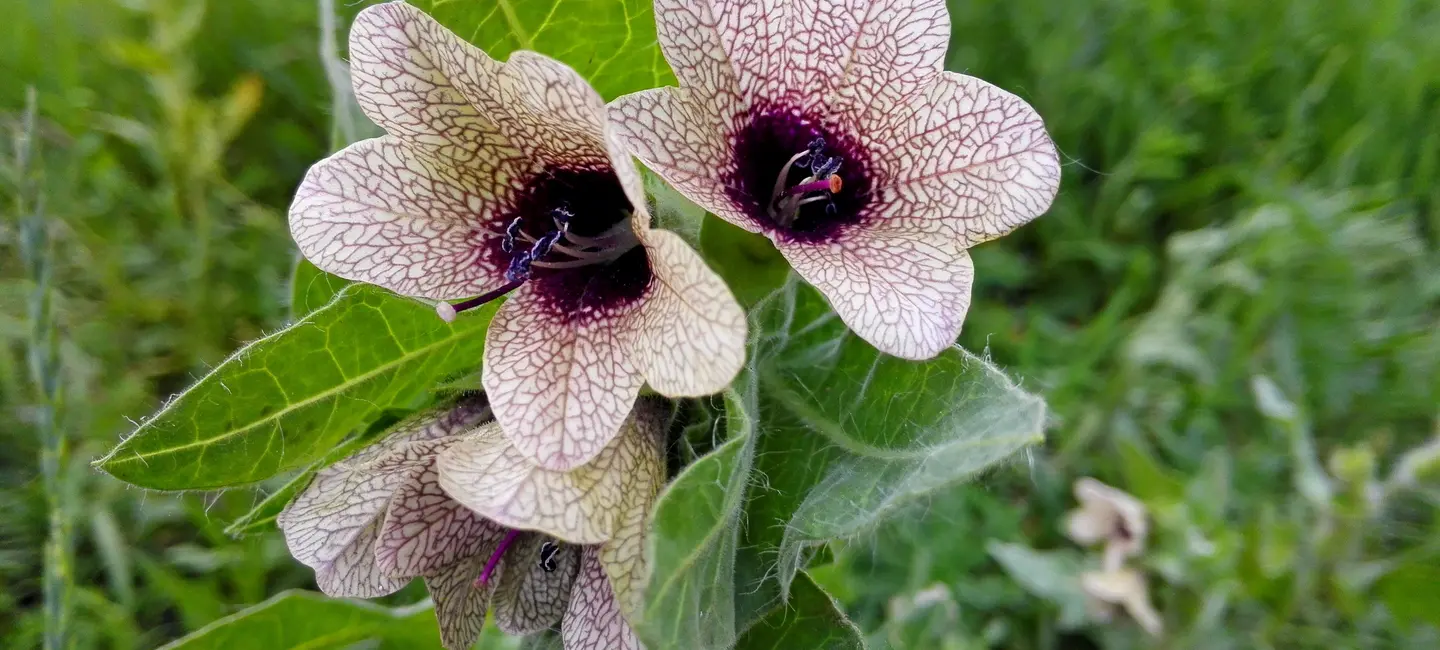
Henbane is a plant. The leaf, flowering tops, and seeds are used to make medicine. But henbane contains chemicals that are poisonous, particularly in high doses. Don't confuse henbane, sometimes called "fetid nightshade" or "stinking nightshade," with bittersweet nightshade or deadly nightshade (belladonna).
Henbane is used for stomach pain, stomach ulcers, muscle cramps, and other conditions, but there is no good scientific evidence to support these uses.
Is It Effective?
NatMed Pro rates effectiveness based on scientific evidence according to the following scale: Effective, Likely Effective, Possibly Effective, Possibly Ineffective, Likely Ineffective, Ineffective, and Insufficient Evidence to Rate.
- Muscle cramps.
- Scarring.
- Spasms of the stomach and intestines.
- Stomach pain.
- Stomach ulcers.
- Toothache.
- Other conditions.
More evidence is needed to rate the effectiveness of henbane for these uses.
Is it Safe?
Henbane contains chemicals, such as hyoscyamine and scopolamine, which might relax the muscles lining the digestive tract. Henbane might also relieve muscle tremors and have a calming effect. If doses are too high, these chemicals can be poisonous.
When taken by mouth: Henbane is POSSIBLY SAFE for most adults when taken for a short time in appropriate doses. Side effects include dry mouth, red skin, constipation, and urination problems. Henbane is LIKELY UNSAFE when used in amounts above the maximum recommended dose of 3 grams daily. High doses of henbane can cause overheating, reduced sweating, vision disturbances, increased heart rate, urination problems, drowsiness, restlessness, hallucinations, delirium, manic episodes, and death.
Special Precautions & Warnings:
Pregnancy and breast-feeding: Don't use henbane if you are pregnant or breast-feeding. Henbane is LIKELY UNSAFE because of the risk of poisoning.
Heart conditions such as heart failure or irregular heartbeat: Don't take henbane if you have heart failure or irregular heartbeat. There are chemicals in henbane that could cause rapid heartbeat (tachycardia) and also make heart failure worse.
Constipation: Don't take henbane if you are constipated. There are chemicals in henbane that could make your condition worse.
Down syndrome: Don't give henbane to people with Down syndrome. They are likely to be especially sensitive to the toxic effects of henbane.
Fever: Don't use henbane if you have a fever. There are chemicals in henbane that may raise your body temperature even higher.
Narrow-angle glaucoma: Don't take henbane if you have narrow-angle glaucoma. There are chemicals in henbane that could make your condition worse.
Trouble urinating (urinary retention): Don't take henbane if you have trouble urinating. There are chemicals in henbane that could make your condition worse.
Digestive tract conditions such as heartburn or "gastroesophageal reflux disease" (GERD), a hiatal hernia, an infection, stomach ulcer, constipation, a blockage, ulcerative colitis, a serious condition called toxic megacolon, or other digestive disorders: Don't take henbane if you have any of these conditions. There are chemicals in henbane that could make your condition worse.
Drying medications (Anticholinergic drugs)
Interaction Rating=Major Do not take this combination.
Henbane contains chemicals that cause a drying effect. It also affects the brain and heart. Drying medications called anticholinergic drugs can also cause these effects. Taking henbane and drying medications together might cause side effects including dry skin, dizziness, low blood pressure, fast heartbeat, and other serious side effects.
Some of these drying medications include atropine, scopolamine, and some medications used for allergies (antihistamines), and for depression (antidepressants).
Herbs that affect the brain and heart (anticholinergic herbs): Henbane is said to be "anticholinergic" because it contains chemicals that can neutralize the effects of a chemical called acetylcholine. Acetylcholine is found naturally in the body. It helps nerves communicate with each other, and it helps nerves communicate with muscles. Acetylcholine plays a big part in regulating heartbeat, blood pressure, response to stress, and many other important body functions. There is some concern that taking henbane along with other anticholinergic herbs might seriously disrupt the systems controlled by acetylcholine and cause harm. Other anticholinergic herbs include angels trumpet, belladonna, European mandrake, jimson weed, and scopolia.
There are no known interactions with foods.
The appropriate dose of henbane depends on several factors such as the user's age, health, and several other conditions. At this time there is not enough scientific information to determine an appropriate range of doses for henbane. Keep in mind that natural products are not always necessarily safe and dosages can be important. Be sure to follow relevant directions on product labels and consult your pharmacist or physician or other healthcare professional before using.
Beleño, Careillade, Devil's Eye, Fetid Nightshade, Fève à Cochons, Hen Bell, Herbe aux Engelures, Hog Bean, Hyoscyami Folium, Hyoscyamus niger, Jupiter's Bean, Jusquiame, Jusquiame Noire, Khurasani-Ajavayan, Parasigaya, Poison Tobacco, Potelée, Stinking Nightshade, Tue Poule.
Information on this website is for informational use only and is not intended to replace professional medical advice, diagnosis, or treatment. While evidence-based, it is not guaranteed to be error-free and is not intended to meet any particular user’s needs or requirements or to cover all possible uses, safety concerns, interactions, outcomes, or adverse effects. Always check with your doctor or other medical professional before making healthcare decisions (including taking any medication) and do not delay or disregard seeking medical advice or treatment based on any information displayed on this website.
© TRC Healthcare 2024. All rights reserved. Use and/or distribution is permitted only pursuant to a valid license or other permission from TRC Healthcare.
